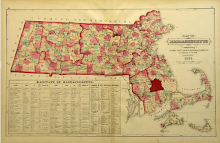
The role of the Reverend Isaac Backus (1724-1806) of North Middleborough as founder of the First Baptist Church of Middleborough, Baptist theologian and historian, and spiritual leader of southeastern Massachusetts' Baptist community has been well documented. Less well known are the contributions Backus made to the advancement of American civil liberties during the Revolutionary period of our history.
A one-time devout adherent of Congregationalism, Backus was a conciliatory man who tried to heal the clefts of religious division he saw opening all about him. Despite his sponsorship of the Baptist faith, Backus remained supportive of his Congregational friends and neighbors and felicitous of their well-being, while speaking out for "Liberty of Conscience" for all faiths.
The defining episode in Elder Backus' development as a religious libertarian was undoubtedly the imprisonment of his widowed mother in Connecticut "for adopting religious sentiments contrary to law," and ever afterward Backus would remain a staunch defender of the rights of religious dissenters.
Backus was an ardent spokesman for the principle of religious tolerance, arguing that "the imposing of religious tests hath been the engine of tyranny in the world." He coupled the ideal of religious liberty with that of political freedom, and articulated this view in several of his many published pamphlets and sermons, including "A Plea for Liberty of Conscience" (1770),
"An Appeal to the Public for Religious Liberty Against the Oppressions of the Present Day" (1773), and "True Policy Requires Equal Religious Liberty" (1779).
In 1774, Backus represented the Warren Association of Separate Baptist Churches' interests before the first Continental Congress, where he was a vocal advocate of religious tolerance and the separation of church and state. To the Baptists, it seemed unreasonable "that they should be called upon to contend for civil liberty if after it was gained they should still be exposed to oppression in religious concerns, when, therefore, the first Continental Congress met in Philadelphia, the Warren Association sent Mr. B. their agent to the convention there to procure some influence in their favor; but their efforts were unavailing; they were told they might as well attempt to change the course of the sun in the heavens as to try to effect a change in their measures respecting religion."
Backus' views were decidedly forward-thinking and, though at times they brought suspicion upon him and cast his patriotism into doubt by others, he was to reiterate them unflinchingly on numerous occasions, including before both the Massachusetts State Constitutional Convention in 1779, and the state convention to adopt the Federal Constitution in 1787.
Sadly, Backus did not live long enough to see the acceptance of religious tolerance for all as a foundation stone of democracy. It was not until the 1830s that the famous Dedham case disestablished Congregationalism in Massachusetts as the "state religion" and established, in principle, religious liberty and tolerance for all faiths, a cause for which Backus had labored his entire adult life.
Though Backus died long before this outcome, his life was full of purpose and continues to provide us with hope. As his epitaph in the Titicut Cemetery at North Middleborough reads: "His zeal and persevering industry in the cause of civil and religious liberty through a long, laborious life is still manifest ... "
For more information see:
This is the earliest comprehensive biography of Backus. Since its publication, numerous biographies and treatises on Backus' life and work have been published.
Illustration:
Elder Isaac Backus (1724-180), engraving, late 18th century.
Backus was Middleborough's passionate spokesman for the cause of religious tolerance. His life's purpose was the establishment of religious liberty for all faiths, a cornerstone of American democracy.























+of+Smoky+Mountains+018.jpg)
1 comments:
Great piece!
Post a Comment